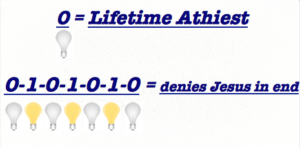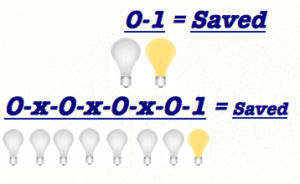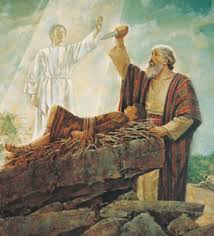Therefore let us move beyond the elementary teachings about Christ and be taken forward to maturity, not laying again the foundation of repentance from acts that lead to death, and of faith in God, 2 instruction about cleansing rites, the laying on of hands, the resurrection of the dead, and eternal judgment. 3 And God permitting, we will do so.
Here, the author is about to build on an idea that’s kind of getting into a more advanced level of theology. Before you get too concerned, I will explain the “elementary teachings of Christ” or what I interpret to mean “the Gospel” and the things that the author here is assuming are already established. It doesn’t take long, but it can be tied into what the Author has been speaking about. Also, Hebrews 6 begins with a word, “Therefore”, and that is usually a red flag that you need to make sure you understand the context of the verse. Even if you don’t take the idea out of context, you still are interrupting a thought process or a line of reasoning. In this case, it’s a little important to not just start with the therefore. So for the sake of review from last post (Hebrews 5), continuity, and an explanation of “the elementary teachings about Christ” let’s read Hebrews 5:12-14.
12 In fact, though by this time you ought to be teachers, you need someone to teach you the elementary truths of God’s word all over again. You need milk, not solid food! 13 Anyone who lives on milk, being still an infant, is not acquainted with the teaching about righteousness. 14 But solid food is for the mature, who by constant use have trained themselves to distinguish good from evil.
The author is addressing some people who have been a disappointment in their progress in their faith. They are no longer trying to learn or understand the things of God, and have spent lots of time in habitual ignorance. On the other hand, people who are mature in their faith understand a number of things because they study the Bible. Mature Believers regularly use the Word of God to renew their minds and transform themselves. Hebrews 5:14 says “Through constant use” and study, Christians become trained to discern Good from Evil. Mature Christians are aware that there is right and wrong. There is an absolute standard of what’s Good and Evil. The Source of that moral standard is God. Without God, we would live in a relativistic place where truth is in the eye of the beholder, and what that boils down to is that there is no difference between good and evil. In such a world, a heinous act like murder or genocide takes on no moral dimension, and is just an exercise in Darwinian survival of the fittest. You see this borne out in concepts like Eugenics or weeding out weak members of the gene pool. These ideas were all too popular in the era of World War II. In such a world where culture is neutral and no moral code is superior to another, Love is merely a chemical imbalance. That chemical reaction temporarily leaves you in a vulnerable state, either interrupting your instinct for self preservation and producing altruism, or if you’re feeling more benevolent, love is a chemical process that evolved to allow competitors to co-operate, increasing their chances of survival. It’s easy to live in such a world, because you don’t have to feel bad when people’s lives are cut short due to starvation, war, disease. You can just rationalize that it’s just nature doing what nature does, and you don’t have to feel bad for not helping. You can turn a blind eye, and just think, “they’re not fit”. It’s sad, but it happens all the time. And what is “fitness” even mean according to Darwin? Just survival until reproduction. The problem with this worldview is even the atheist would object to that line of reasoning once they were the recipient of unfairness, a lawless incursion, or didn’t receive help when they needed it. The Bible teaches that there is right and wrong, and our conscience and hearts all seem to attest to the fact that some things are just not right. Here, the Bible teaches about a concept called righteousness. It’s alluded to in Hebrews 5:13.
Righteousness means being good and not just doing the right thing, but doing the right thing for the right reasons. Righteousness means acting out selfless love for others. The opposite of Righteousness is Wickedness, and unfortunately for human beings, it is in our nature to be wicked. The Bible says that we will face judgement for our wickedness and our sins. Eternally lasting judgement. Righteousness is scarce, and pure, or absolute, righteousness is non-existent among human beings. It’s not our nature.
Now, in order to be freed from wickedness and sin, we need to acknowledge it and repent of it, and basically say that we prefer God’s way to our sinful way. The sacrificial system allows us to borrow something else’s innocence and switch our wickedness for their righteousness. That swapping is a process called imputation. The High Priests would borrow a ram or a goat’s innocent blood, and impute the animal’s purity or righteousness on themselves and the Israelite community. Meanwhile the guilt from the peoples’ sins would be placed on the sacrificial lamb. This is all Old Testament doctrine, but when Christ arrives, we understand what the perfection and completion of this law means. We don’t have righteousness, but we can repent of our sins and look to the sacrificial system to be made right before God. First we need a high priest to represent sinful man to holy God. That High Priest is Christ. The High Priest needs to offer something perfect to atone for our sin, and to do the imputation swapping of our sin for this sacrifice’s righteousness. That perfect Lamb without blemish, that offering, is also Christ. So our Righteousness is now Christ Himself. When we put on the Righteousness of Christ we have a promise that we will be resurrected from the dead and spend an eternity with God, as an adopted son or daughter in His Kingdom. We’ve been saved from our sins and our transgressions. That’s called salvation. Now what allows us to experience all of this is not an act or thought on our part. The Bible teaches that salvation is not a work, or based on something we do, so we can not boast. It’s the choice of God, and the works that Jesus did, and the counsel or guidance of His Holy Spirit in our hearts. This Salvation concept is the elementary truth of God’s word and of Christ. Here’s where it gets advanced. This Salvation and work of the Holy Spirit is something that we have been chosen for before the foundation of the Earth. Sometimes people like to have debates about whether you can lose your salvation or whether you are “once saved, always saved”
These topics are things that theologians argue about. Let’s read on to Hebrews 6:4-6 for another perspective on this.
4 It is impossible for those who have once been enlightened, who have tasted the heavenly gift, who have shared in the Holy Spirit, 5 who have tasted the goodness of the word of God and the powers of the coming age 6 and who have fallen away, to be brought back to repentance. To their loss they are crucifying the Son of God all over again and subjecting him to public disgrace.
People talk about losing your salvation versus “once saved, always saved” So in Hebrews here, there’s a similar discussion about losing and then regaining salvation. Here the Bible teaches that it’s impossible to Return to a state of salvation if you’d truly had it, but lost it. This line of thinking is kind of interesting. Let’s use an analogy. If you look at it like switching a light switch (not the best analogy, but that’s how a “you can lose your salvation” proponent might see the world). If every off is not saved, or 0 and every on is you are saved, or a 1, then this verse is saying that a path that looks like
0 or Lifetime Atheist, is the same end result as a path that looks like 0-1-0-1-0-1-0 (where you are a born as heathen sinner, you then have a moment where you “come to Jesus” and love God, fall away, and come back to God a second time, fall away a second time, return to God a third time, and fall away in the end.
We can all agree that those two paths are actually the same end state and result; Not saved. Condemnation for your sin and eternal separation from God. Now let’s look deeper in light of the teaching here. In Hebrews 6:4-6 it’s actually saying that the second and third of those 1’s in my path are not actually 1’s at all, because you can’t ever come back and brought back to repentance.
It’s impossible. So maybe you could lose your salvation but you can never RE-lose your salvation. So the modified path is 0-1-0-x-0-x-0. Here, 0 is not saved, 1 is “Saved?”, and x is false salvation.
Is that first 1 truly a state where you were saved for a moment? Maybe you could believe that in a vacuum, but let’s read a few other verses. Here’s John 10:27-29. Jesus compares himself to a good Shepherd, and His people or followers as His sheep.
27 My sheep listen to my voice; I know them, and they follow me. 28 I give them eternal life, and they shall never perish; no one will snatch them out of my hand. 29 My Father, who has given them to me, is greater than all; no one can snatch them out of my Father’s hand.
Jesus says that he will never let anything snatch his sheep from his hand. If that’s the case then a path like 0-1-0-x-0-x-0 would never possibly exist. That first 1 that leads to a bunch of x and 0 states is actually also an x because Jesus himself said that nothing could snatch sheep from His or His Father’s hand.
There can never be a 0 end state for someone who was saved. The book of First John is another place in the Bible that says that if you are truly saved, you will persevere in the end. Let’s read 1 John 2:19
19 They went out from us, but they did not really belong to us. For if they had belonged to us, they would have remained with us; but their going showed that none of them belonged to us.
If you are truly saved, you are among those who are truly enlightened, who know the heavenly gift of God, who partake in and are filled with the Holy Spirit. This isn’t something that you can just turn off and on. This has to do with your very identity and calling. For those who think people can lose your salvation, or back-slide, this verse in Hebrews means that it’s impossible to lose it and then regain it. What is interesting is that if you truly had this calling, you’d never be able to lose it to begin with. If you “fall away”, to the point of saying you didn’t need Christ to begin with, then you were never really a Christian or saved. No matter how good you looked in church, or how much you did to make it look like you loved Jesus, you couldn’t have truly loved Him if you eventually denied Him. People that end up denying Christ were never one of those who were the elect in the first place.
However, if you spend your life denying Him, or bouning back and forth between pretending to love Jesus and denying Jesus, your path might look like a bunch of 0’s and x’s, or fake salvations. Taking the most crazy path life can dish out, only to come to realize at some point that you were wrong, you can still repent of all of your disbelief. As long as you’re still alive, and as long as it’s today, and you can call today “Today” you can truly repent and hear the Call, and respond.
These two are functionally the same, because the person ends up saved. All x’s and 0’s represent an unrepentant sinner. Basically we were dead and have become alive. When you truly repent, when you truly taste the Spirit, there is no falling away, because you are in the arms of an almighty God. And we have a promise that when you believe, you will stay believing. In fact, your destiny was to believe, because you were chosen well before you could do anything to negatively or positively change it:
7 Land that drinks in the rain often falling on it and that produces a crop useful to those for whom it is farmed receives the blessing of God. 8 But land that produces thorns and thistles is worthless and is in danger of being cursed. In the end it will be burned.
Here the Author makes a comparison of two different pieces of land. Land that produces a crop that’s useful to those for whom it was farmed received the blessing of God. There’s a lot of “for whom” “to those” which can confuse modern readers. But let’s boil this down a bit. Land that produces crops that are useful are blessed. What does the useful mean? Useful is in the eye of the beholder, and strangely enough, this passage doesn’t really explain what they are using the land for. It just says “a crop.” The crop should be useful to the person that farms the crop. If it is useful to that person or party, then it’s a blessing from God. On the other hand, the analogy says Thorns and Thistles are deemed worthless and in danger of being cursed. This analogy is just asking the question, am I a fruitful or valuable person? We don’t even need to get into what fruit you have or who you are valuable to. There’s no point in ranking gifts or even results. That discussion can be had another time. The questions you should ask yourself is 1) Are you drinking in the rain, are you drinking in the teaching of God? If no, then you should! It’s valuable for whatever is next. And the next question is 2) Does that rain produce something that can be seen of any value by anybody? Does your faith have a result or lead to anything? I would argue that the verse implies that the person who the crop is farmed for is ultimately God. If you live to be a blessing to others, maybe your fruitfulness benefits your neighbors, friends, family. But ultimately, you are living your life for the glory and honor of God. And if you live that way, you receive blessings of God. If you don’t live that way, then you may be living in such a way that you are going through motions and your life might be a series of 0’s and x’s. This is kind of scary and weighty to think about. I don’t speak to condemn anyone, but you should think, meditate, and examine your own lives and see how you live and who you are living for. If you see thorns and thistles in your life or the life of someone you care about, you should return to the word of God and continue training and using it
9 Even though we speak like this, dear friends, we are convinced of better things in your case—the things that have to do with salvation. 10 God is not unjust; he will not forget your work and the love you have shown him as you have helped his people and continue to help them.
The discussion has been somber and weighty. But after discussing these serious ideas of salvation and falling away, and whether someone is truly saved or not, the Author encourages the readers In verse 9. “Even though we speak like this, we are convinced of better things.” At the end of chapter 5 we learned that there have been people in this ministry who continued in ignorance. But now we’re reading that there have also been people who were earnestly following God, laboring for each other, acting out their love for God and making their faith translate into action. These people have been fruitful. These people have reaped a harvest, a crop that illustrates a blessing from God.
11 We want each of you to show this same diligence to the very end, so that what you hope for may be fully realized. 12 We do not want you to become lazy, but to imitate those who through faith and patience inherit what has been promised.
In Verse 11 the author encourages them to continue in their diligence and then their hopes will become realization. And even though salvation is based on Faith alone, and isn’t based on the things you do, Laziness actually indicates a lack of faith, translating in to a lack of actions. The author wants something better for the readers. He wants them to inherit a promise.
13 When God made his promise to Abraham, since there was no one greater for him to swear by, he swore by himself, 14 saying, “I will surely bless you and give you many descendants.” 15 And so after waiting patiently, Abraham received what was promised.
When humans make promises, we often swear on something greater than ourselves. We say things like, “with God as my witness, I will do this” or “I solemnly swear” with our hand on a Bible.
When God makes a promise, he has nothing greater than Himself, so His own word is the promise and the guarantee. In Genesis 22, after Abraham was prepared to sacrifice his only son, Isaac, God said:
“I swear by myself, declares the Lord, that because you have done this and have not withheld your son, your only son, 17 I will surely bless you and make your descendants as numerous as the stars in the sky and as the sand on the seashore. Your descendants will take possession of the cities of their enemies, 18 and through your offspring all nations on earth will be blessed, because you have obeyed me.”
God gave Abraham a series of promises, that his descendants would be numerous, they would inherit their promised land, and all nations or peoples on Earth would be blessed through his offspring. This was in response to Abraham’s intended offering of Isaac. When we read the story of Isaac being offered by Abraham, I think we are supposed to shudder and be a bit disgusted. People ask, “What kind of God would make a man sacrifice his only son?” or “What kind of offense is so bad that it requires a sacrifice so great?” Often times these are asked self-righteously by someone who doesn’t even believe in God, or is intending to prove the God of the Bible is a terrible being. These are actually good questions that are actually on the right track. You must remember God asked Abraham from a place of omniscience. God knew that at that moment, He would provide a ram for Abraham. Abraham didn’t know that. So in God’s omniscient reality, He never made Abraham sacrifice his son. That was never how this story ended. God was not a God who made a man (Abraham) sacrifice his son (Isaac). But in Abraham’s mind, it could have ended that way. Abraham had to sacrifice his son in his mind. In the course of Abraham’s faith and obedience, he had to imagine a world where God’s will was above his desire for Isaac. He had to imagine that Isaac wasn’t to be the beginning of numerous descendants. Abraham spoke to Isaac and prophesied that God would provide a lamb. So that question about “What kind of offense is so great that someone has to sacrifice their own son?” The sins of the world required sacrifice, and the only way we can even begin to understand what God did for us, is to try and understand what Abraham did with Isaac. Abraham prophesied that God would provide a lamb. The lamb was actually God’s only begotten son, and He was sacrificed for us. This is the completion of God’s third promise to Abraham, that all peoples would be blessed through Abraham’s seed.
16 People swear by someone greater than themselves, and the oath confirms what is said and puts an end to all argument. 17 Because God wanted to make the unchanging nature of his purpose very clear to the heirs of what was promised, he confirmed it with an oath. 18 God did this so that, by two unchangeable things in which it is impossible for God to lie, we who have fled to take hold of the hope set before us may be greatly encouraged.
When you buy an insurance policy, you are trying to manage a future unknown event, or uncertainty. A guarantor ensures a future guarantee, and makes a promise. If you buy auto insurance from a guy on the street, you might have a promise, but it isn’t backed by someone who can make good on the outcome. God made a promise about our future, even though we were enemies, he’s made us friends. Even though we’ve sinned, God will forgive us and redeem us. It was an Oath from God, sworn by Himself. So that means the Oath has a nature that was unchanging and unchangeable, like the oath maker, and the guarantor. Hebrews says this puts an end to all argument. God is not a liar; that is impossible in light of His nature. So the promise of God is guaranteed by His own Sovereignty and His own unchangeable nature. It’s a promise that sets before us a Hope. The hope that is set before us is there to encourage us. The goal is encouragement.
19 We have this hope as an anchor for the soul, firm and secure. It enters the inner sanctuary behind the curtain, 20 where our forerunner, Jesus, has entered on our behalf. He has become a high priest forever, in the order of Melchizedek.
We live in uncertainty. We don’t know how our lives will develop, how they will end. But God wants us to be encouraged! He has promised His people eternity with Him, and backed the promise based on himself, His unchanging nature. His promises are backed by the same power that created the universe. Because of this, we have hope. And this hope is an anchor for our souls. What’s the implication here? Our souls and our nature are prone to drift and wander. Remember when we read Hebrews 2:1-9? It says “We must pay the most careful attention, therefore, to what we have heard, so that we do not drift away.” We need to be anchored in something, bigger and more unmoving than ourselves. We need security that is based on something more certain than our whims. Our ultimate goal is to be in God’s presence, and the inner sanctuary behind the curtain is where God lived throughout the Old Testament.  Behind the curtain still represents that holy place where God is. Jesus Christ is the way, he’s the high priest. He is the sacrifice. He entered on our behalf. He has become an eternal high priest! We have much to praise God for. Next post,we will discuss Melchizedek.
Behind the curtain still represents that holy place where God is. Jesus Christ is the way, he’s the high priest. He is the sacrifice. He entered on our behalf. He has become an eternal high priest! We have much to praise God for. Next post,we will discuss Melchizedek.










One thought on “Hebrews 6”